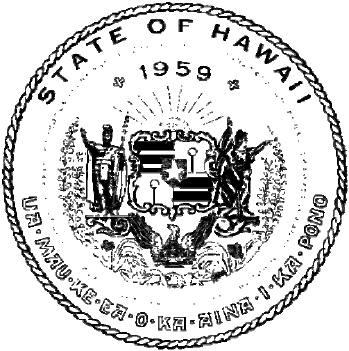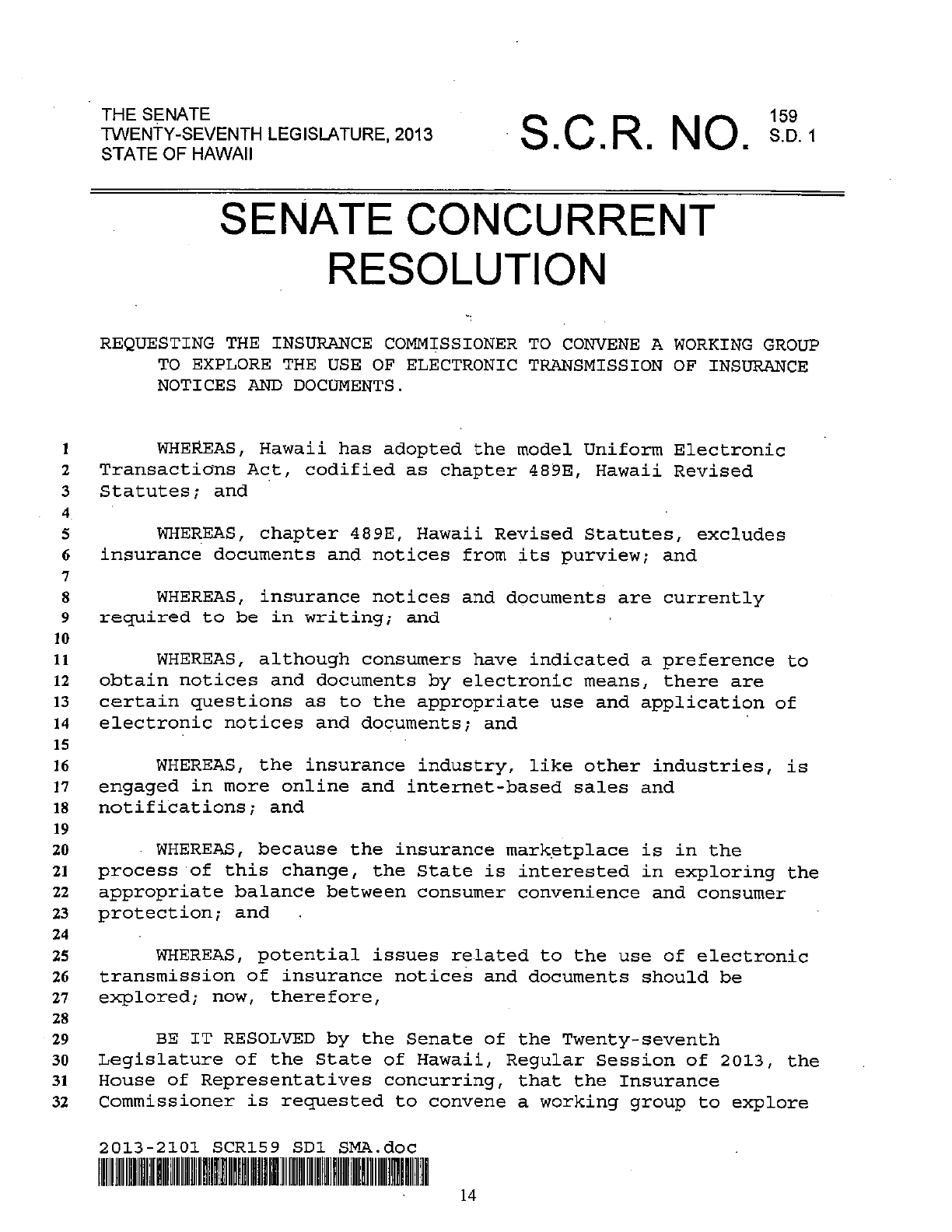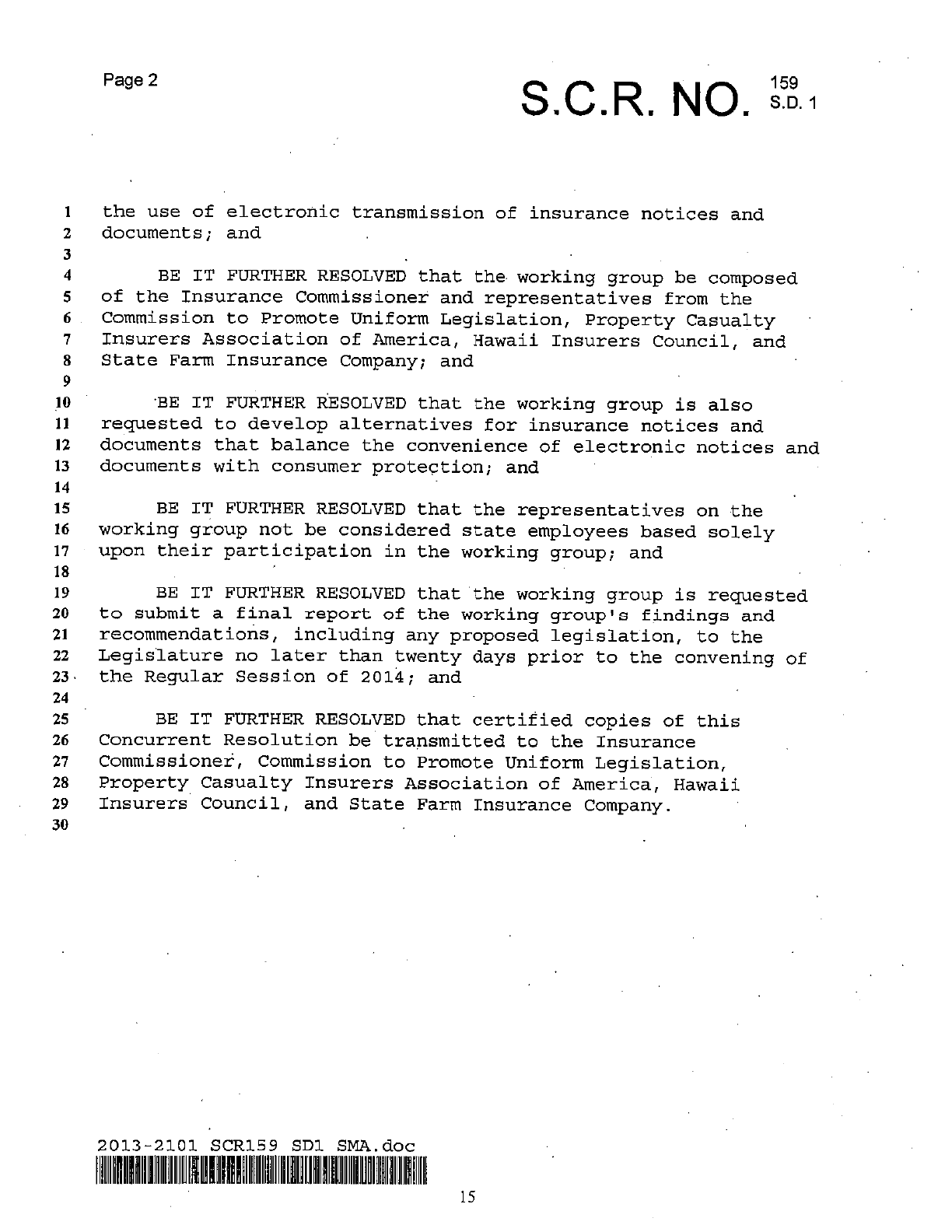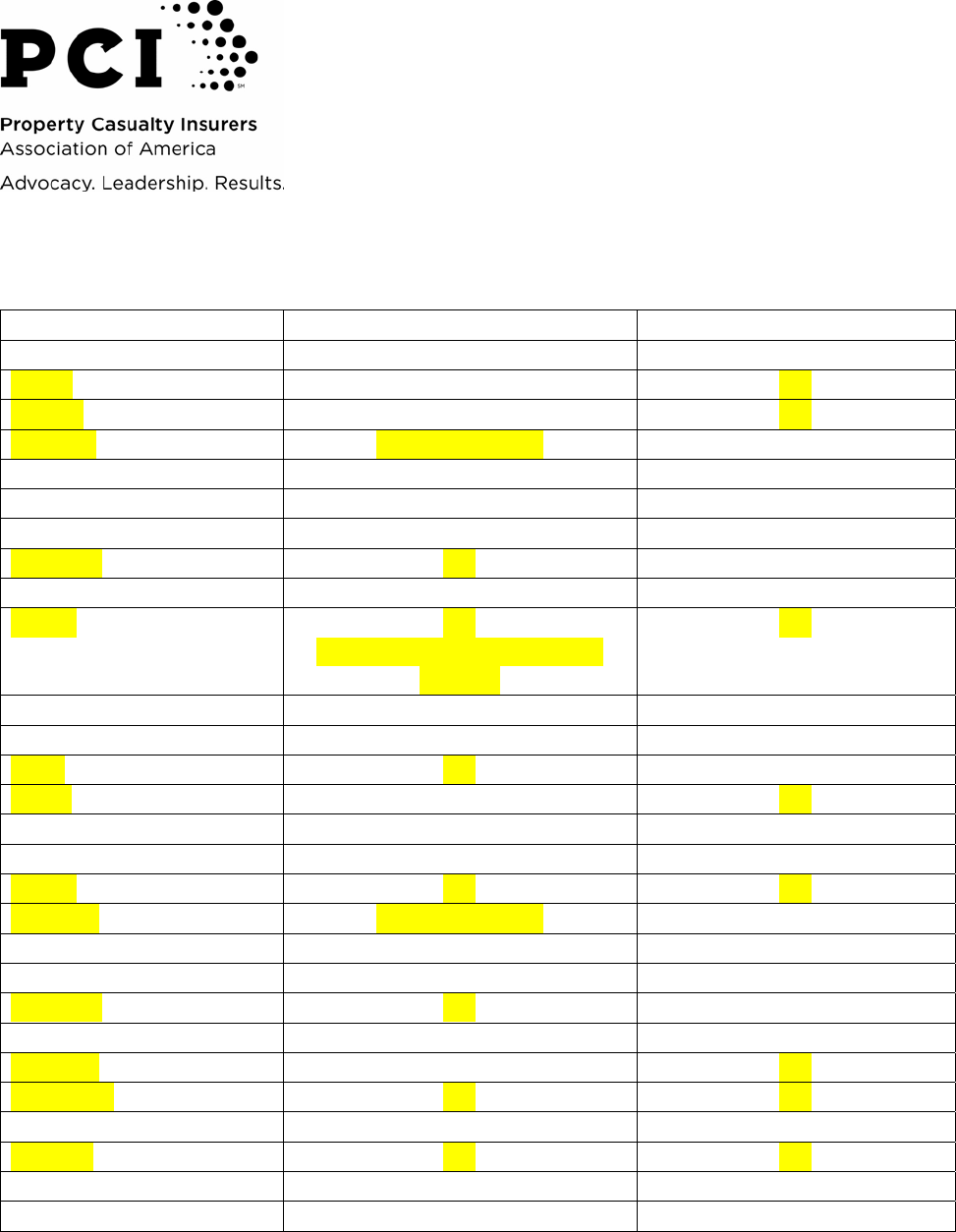
REPORT OF THE
ELECTRONICS INSURANCE NOTICES AND
DOCUMENTS WORKING GROUP
Pursuant to S.C.R. No. 159, S.D. 1 (2013)
REQUESTING THE INSURANCE COMMISSIONER TO CONVENE A
WORKING GROUP TO EXPLORE THE USE OF ELECTRONIC
TRANSMISSION OF INSURANCE NOTICES AND DOCUMENTS
Prepared by the
INSURANCE DIVISION
DEPARTMENT OF COMMERCE AND CONSUMER AFFAIRS
STATE OF HAWAII
December 2013
ii
TABLE OF CONTENTS
Introduction……………………………………………………………………………. 1
Discussion…………………………………………………………………………….. .2
I. Model Law……………………………………………………………….. 2
A. Electronic Delivery of Insurance Documents………………… 3
B. Electronic Posting………………………………………………. 4
II. Use of Electronic Insurance Notices and Documents in Other
States…………………………………………………………………….. 5
III. Electronic Posting in Other States……………………………………. 5
IV. Industry Interests……………………………………………………….. 6
V. Consumer Interests and Concerns…………………………………… 6
VI. Uniform Electronic Transactions Act………………………………..... 8
Findings and Recommendations…………………………………………………..10
Appendices
A. Senate Concurrent Resolution No. 159, S.D. 1, Twenty-seventh
Legislature, 2013…………………………………………………...................14
B. Model Merged Insurance Transaction Modernization Electronic
Delivery or Posting……………………………………………………………..16
C. Property Casualty Insurers Association of America e-posting/
e-delivery - Laws & Regulations Reference Chart………………………….21
ELECTRONIC INSURANCE NOTICES AND DOCUMENTS
WORKING GROUP REPORT
INTRODUCTION
Senate Concurrent Resolution No. 159, S.D. 1 (2013) (“SCR 159”) requested the
Insurance Commissioner to do the following:
(1) Convene a working group to explore the use of electronic transmission of
insurance notices and documents; and
(2) Develop alternatives for insurance notices and documents that balance the
convenience of electronic notices and documents with consumer protection.
A copy of the resolution is attached as Appendix A.
SCR 159 specified that the Working Group be composed of the Insurance
Commissioner and representatives from the following: Commission to Promote Uniform
Legislation (“Hawaii Commission”); Property Casualty Insurers Association of America
(“PCI”); Hawaii Insurers Council (“HIC”); and State Farm Insurance Company (“State
Farm”).
The Working Group consisted of the following: Gordon Ito, Insurance
Commissioner; Alex Hageli, PCI; Isaac Kosasa, HIC; Lori C. Lum, Watanabe Ing LLC
representing PCI; Robert R. Nash, State Farm; Alison Powers, HIC; Mark Sektnan, PCI;
and Bob Toyofuku, Hawaii Commission.
Additional participants in the Working Group were: Martha Im, Insurance
Division; Robert Joslin, Hawaii Public Adjusters; David Leifer, American Council of Life
Insurers (“ACLI”); Ann Le Lievre, Insurance Division; Joann Waiters, ACLI; and Tiffany
Yajima, Ashford & Wriston, LLLP.
1

SCR 159 requested that the Legislative Reference Bureau submit a final report of
the Working Group’s findings and recommendations, including any proposed legislation,
to the Legislature no later than 20 days prior to the convening of the Regular Session of
2014.
The Working Group met over the course of August 2013 through November
2013. Minutes from each meeting, with accompanying exhibits discussed during the
meetings, are posted on the Department of Commerce and Consumer Affairs,
Insurance Division website at: http://hawaii.gov/dcca/ins/.
DISCUSSION
I. Model Law
The Working Group reviewed and discussed a model law drafted by the
insurance industry, the Model Merged Insurance Transaction Modernization Electronic
Delivery or Posting (“Model Law”), which allows for both electronic delivery of insurance
documents and notices, as well as for electronic posting of property and casualty
insurance documents that contain no personally identifiable information
1
. Although the
Model Law has not been adopted by a majority of the states, it has been adopted, in
whole or in part, by some states within the past two (2) years with the support of the
insurance industry. See Appendix B.
The Model Law has two (2) components. The first part allows for electronic
delivery of all insurance notices and documents, provided the consumer affirmatively
consents, or opts-in, to receiving specific notices or documents electronically. The
1
The first iteration of part 1 of the Model Law began circulating in approximately 2009, while part 2 of the
Model Law began circulating in approximately 2011. In late 2012, the two (2) parts were joined to form
the Model Law, the most recent iteration of which is dated March 2013.
2

second part of the Model Law allows for electronic posting on a website of standard
policy forms and endorsements that contain no personally identifiable information,
provided that the consumer does not specifically request, or opts-out, to receiving those
documents in paper form.
A. Electronic Delivery of Insurance Documents
Part 1 of the Model Law, entitled “Electronic Notices and Documents”, allows for
delivery of insurance documents to a recipient’s electronic mail address or posting of
the same on an electronic network or site accessible via the internet, together with
separate notice of the posting to a recipient’s electronic mail address, provided the
recipient affirmatively consents, or opts-in, to receive the documents by electronic
means. Part 1 is intended to apply to all insurance notices and documents, including
those that contain personally identifiable information.
In addition, the recipient must be provided a statement regarding the right to
receive a paper copy of the documents. The statement must include language
regarding the right to withdraw such consent, whether the consent applies to a single
transaction or categories of documents, the means to obtain a paper copy and any
associated fees for paper copies, and the procedure to withdraw consent. There must
also be information provided regarding hardware and software requirements, and any
updates to such, to access electronic documents. Other provisions in part 1 of the
Model Law address the validity of the transaction if consents or acknowledgment of
receipt of notices or documents are not verified, effect of prior transactions in the event
consent to electronic delivery is revoked, electronic storage of oral consents, and
3

acknowledgment of the federal Electronic Signatures in Global and National Commerce
Act (“E-SIGN”), Public Law 106-229, codified at 15 USC § 7001 et seq.
B. Electronic Posting
Part 2 of the Model Law, entitled “Posting of Policies on the Internet”, allows for
electronic posting of property and casualty insurance notices and documents on a
website, usually the insurers’ website, for retrieval by the policyholder. Documents that
would be posted electronically are restricted to those that do not contain personally
identifiable information, such as the standard policy form and standard endorsement.
The insurer would post these documents on their website unless the policy holder
specifically declines to receive an electronic copy, or opts-out, and will then receive a
paper copy.
Certain conditions must be in place for electronic posting to occur, including that
the policy and endorsements: 1) must be accessible for as long as the policy is in force;
2) are archived for five (5) years after expiration; and 3) are posted in a manner that
allows the insured to retrieve and print using software widely available on the internet
and free to use. Further, the insurer is to provide certain information with the
declarations page and any renewals, including the exact policy and endorsement forms
purchased, the method by which the insured may obtain without charge a paper copy of
the policy, and the internet address where the policy and endorsements are posted.
Lastly, the insurer must provide notice in the format preferred by the policy holder, of
any changes to the forms or endorsements, the right to obtain a paper copy of
documents, and the internet address where the forms are posted.
4

II. Use of Electronic Insurance Notices and Documents in Other States
Generally speaking, an insurance document may be delivered electronically
unless: (1) it is expressly prohibited, as enumerated in Hawaii’s Uniform Electronic
Transactions Act (“UETA”), Hawaii Revised Statutes (“HRS”) §489E-3(b)(3)(C); or (2) a
law requires a specific document to be delivered via first class mail. The Working
Group gathered information about use of electronic insurance notices and documents in
other states. Eleven (11) states
2
have enacted insurance code provisions that allow for
electronic delivery of policies and endorsements and an additional three (3) states
3
have issued bulletins which have interpreted electronic mail to equate with physical mail
under the respective states’ insurance code sections. See Appendix C.
III. Electronic Posting in Other States
Currently, twelve (12) states allow for electronic posting, or e-posting, of
insurance documents.
4
Of the twelve (12) states, eight (8) states
5
restrict e-posting to
property and casualty policies or endorsements, three (3) states
6
are silent as to the
lines of insurance qualifying for e-posting, and one (1) state
7
restricts e-posting to
automobile policies.
2
Delaware, Florida (for commercial lines policy only, must opt-out), Idaho, Kansas, Maryland, Minnesota,
Missouri, North Carolina, Pennsylvania, Texas, and Virginia.
3
Arkansas, Kentucky, and Tennessee.
4
Alaska, Arizona, Florida, Illinois, Kansas, Michigan, Minnesota, Missouri, Oklahoma, Pennsylvania,
Texas, and Virginia.
5
Alaska, Arizona, Florida, Minnesota, Missouri, Oklahoma, Texas (also includes automobile policies for
e-posting), and Virginia.
6
Illinois, Kansas, and Pennsylvania.
7
Michigan.
5

IV. Industry Interests
The industry supports parts 1 and 2 of the Model Law. Insurers are in favor of
allowing electronic delivery of all documents, including those that contain personally
identifiable information, if the consumer affirmatively opts-in to receive such notices and
documents electronically. In addition, insurers support e-posting of standard policies
and endorsements that contain no personally identifiable information where policy
holders must opt-out to receive a paper copy of those documents. Other than the
exemptions under E-SIGN regarding electronic notices of cancellations for life insurance
benefits (except for annuities) and health insurance and benefits, industry
representatives were in favor of electronic notices and documents for all lines of
insurance.
Industry representatives stated that consumers are increasingly requesting
electronic documents, especially younger consumers who are technology savvy and
prefer electronic transactions. Electronic documents allow for cost savings for the
insurer for printing and mailing, which are then passed on to the consumer, as well as
environmental savings in fossil fuel and paper waste. The electronic format allows for
documents to be readily available and accessible from the internet, and in a searchable
format.
V. Consumer Interests and Concerns
While there were no named representatives in the Working Group representing
formal consumer advocate organizations or interests, comments shared during Working
Group meetings did not, in general, indicate strong opposition to part 1 of the Model
Law, allowing electronic notices and documents to be transmitted electronically when
6
the consumer opts-in to receive those documents electronically. However, the Hawaii
Commission strongly opposed any electronic cancellation, termination, lapse, or
material alteration of a contract of insurance, insurance benefits, life settlement or
viatical settlement agreements, or service contract. Additionally, the Hawaii
Commission and public comments indicated concerns regarding the language in part 2
of the Model Law that allows insurers to post standard policies and endorsements on
the internet unless the consumer opts-out to receive those documents in paper form. In
particular, the concern was that many consumers would find it confusing to opt-in for
one set of documents, and opt-out for another category of documents.
Hawaii’s consumers include the elderly and many immigrants for whom English
is a second language; either or both groups may not be technology savvy. In addition,
rural areas in Hawaii have limited cell phone or internet access. Having standard
policies and endorsements automatically posted on the internet may hamper
consumers’ access to electronically posted documents. Consumers may not
understand that the standard policy form is available on the internet and that they would
need to opt-out to request a paper copy. Other concerns included consumers who
would not understand that the declarations page was not the policy, which would be a
separate document available through the insurer’s website. There was also concern
that changes to standard policy forms and endorsements may be transmitted
electronically but not received due to an inaccurate email address or filtered out as
spam, resulting in consumers being unaware of such changes even if the consumer
opted-in to receive e-documents.
7

Additionally, fees for paper copies of notices and documents were discussed.
One concern voiced regarding part 1 of the Model Law addressed discounts for
consumers who opt-in to receive electronic notices and documents, then later change
their mind and request paper copies. Any charges for paper copies should be equitable
in relation to the discount for opting-in for electronic documents. For part 2 of the Model
Law, while some industry representatives in the Working Group stated they would not
impose any fees for consumers who opt-out to receive a paper copy of standard policy
forms and endorsements, there are some insurers who do charge for paper copies of
the standard policy forms and endorsements. Working Group industry representatives
also stated they may later reassess if a fee would be imposed for continuing to receive
paper copies of standard policies and endorsements.
Finally, the Working Group was cognizant that electronic delivery of notices and
documents must be compliant with the Americans with Disabilities Act and other state
disability laws.
VI. Uniform Electronic Transactions Act
The UETA was developed in 1999 by the National Conference of Commissioners
on Uniform State Laws to enable use of electronic records and signatures relating to a
transaction between two (2) or more individuals in the conduct of business, commercial,
or governmental affairs. UETA was meant to allow for electronic records and electronic
signatures to have the same legally binding effect as paper records and manual
signatures, provided that the two (2) parties agree to those terms.
8

Forty-seven (47) states, including Hawaii, have adopted UETA. The three (3)
states
8
which have not adopted UETA have enacted statutes that essentially allow for
use of electronic transactions. Hawaii’s UETA statute, codified at HRS Chapter 489E,
allows for and recognizes electronic records and signatures. However, there is a
specific exclusion for certain types of insurance documents. HRS § 489E-3(b)(3)(C)
states in part as follows:
(b) This chapter does not apply to a transaction to the extent it is
governed by: . . .
(3) A law or rule governing notice of: . . .
(C) Cancellation, termination, lapse, or material alteration of
a contract of insurance, insurance benefits, life settlement or
viatical settlement agreement, or service contract.
If the Legislature allows for electronic delivery of notices of cancellation, termination,
lapse, or material alteration of a contract of insurance, insurance benefits, life settlement
or viatical settlement agreement, or service contract, then HRS § 489E-3(b)(3)(C) may
need to be amended, as well as a substantial number of provisions requiring written
notice in the Insurance Code. A partial listing of the affected provisions in the Insurance
Code is as follows:
Article 3A, Chapter 431
Notices related to the privacy of personal financial information
Article 10, Chapter 431
Disclosure of healthcare coverage
Application for insurance coverage
Execution of policies
Delivery of policies
Notice of cancellation or non-renewal
Assignment of polices
8
Illinois, New York, and Washington are the three (3) states which have not adopted UETA.
9
Article 10A, Chapter 431 Health Insurance
Cancellation non-renewal reinstatement of coverage
Notice of right to return the policy – free examination of policy
Article 10C, Chapter 431 Motor vehicle Insurance
Notice of replacement of insurance by a subsidiary or affiliate of insurer
Notice of cancellation or non-renewal
Disclosure of personal injury protection limits and payments
Article 10D, Chapter 431 Life Insurance and Annuities
Disclosure requirements of insurers and producers
Disclosure and reporting when replacing life insurance with a new policy
Article 10H, Chapter 431 Long Term Care Insurance
Disclosure of right to return policy free look at policy
Report of long term care benefits
Notice of unintentional lapse
Notice of lapse or termination for non-payment of premium
Standard format and outline of coverage
Chapter 431C, Life Settlements
Disclosures to Owners
If the Legislature allows electronic notices for cancellation, termination, lapse, or
material alteration of a contract of insurance, insurance benefits, life settlement or
viatical settlement agreement, or service contract notices, where the Insurance Code is
silent as of these types of documents, HRS § 489E-3 requires clarifying language to
specifically allow for this.
FINDINGS AND RECOMMENDATIONS
After much discussion and deliberation, the Working Group makes the following
findings and recommendations:
1. All Working Group representatives agree that a growing number of
consumers prefer communicating with insurers electronically rather than
10
through traditional means, including receiving documents, notices, and
policy forms.
2. There was no unanimous agreement as to recommendations on electronic
transmission of insurance notices and documents:
a. Industry Working Group representatives agree insurers that wish to
do so should be permitted, but not required, to offer their
policyholders the option to receive all insurance notices and
documents electronically. In addition, industry Working Group
representatives agree that insurers should be permitted, but not
required, to post standard forms and policies that contain no
personally identifiable information on insurers’ websites for
purposes of satisfying their legal obligation to deliver such
documents to their policyholders.
b. While the Hawaii Commission to Promote Uniform Legislation
(“Hawaii Commission”) recognizes the benefits of electronic
transmission of insurance notices and documents, the Hawaii
Commission supports insureds affirmatively consenting to receive
electronically certain insurance notices and documents, including
those that do not contain personally identifiable information.
However, the Hawaii Commission specifically opposes any
electronic notices and documents that are in direct contravention to
Hawaii’s UETA, HRS §489E-3(b)(3)(C), which specifically prohibits
electronic delivery of notices of cancellation, termination, lapse, or
11
material alteration of a contract of insurance, insurance benefits, life
settlement or viatical settlement agreement, or service contract.
c. The Insurance Commissioner recognizes the benefits of electronic
transmission of insurance notices and documents and supports
allowing consumers to choose to receive insurance notices and
documents. However, the Insurance Commissioner is opposed to
the automatic e-posting of documents and requiring the consumer
to opt-out or affirmatively choose to receive certain documents in
paper format. Additionally, the Insurance Commissioner is
concerned with any fees insurers may impose for paper copies of
documents.
3. There was no unanimous agreement on proposed legislation:
a. Industry representatives agree to adoption of both parts 1 and 2 of
the Model Merged Insurance Transaction Modernization Electronic
Delivery or Posting (“Model Law”).
b. The Hawaii Commission opposes any legislation allowing for
electronic delivery of notices of cancellation, termination, lapse, or
material alteration of a contract of insurance, insurance benefits, life
settlement or viatical settlement agreement, or service contract, in
direct contravention to Hawaii’s UETA, HRS §489E-3(b)(3)(C).
c. The Hawaii Commission and the Insurance Commissioner oppose
any proposed legislation allowing for automatic electronic posting of
12
13
documents or notices that would then require the consumer to
affirmatively request, or opt-in to receive, paper copies of the same.
4. The Legislature should consider language in the Model Law and
determine if industry and consumer interests may be accommodated by
allowing electronic transmission of insurance notices and documents.
5. The Legislature may need to consider whether rulemaking is necessary
before implementation of any statute allowing for electronic transmission
of insurance notices and documents, to provide appropriate guidance to
insurers and consumers.

APPENDIX A
THE SENATE
TWENTY-SEVENTH LEGISLATURE, 2013
STATE OF HAWAII
S.C.R. NO.
SENATE CONCURRENT
RESOLUTION
159
S.0.1
REQUESTING
THE
INSURANCE
COMMISSIONER
TO
CONVENE
A
WORKING
GROUP
TO
EXPLORE
THE
USE
OF
ELECTRONIC TRANSMISSION
OF
INSURANCE
NOTICES
AND
DOCUMENTS.
1
WHEREAS,
Hawaii
has
adopted
the
model
Uniform
Electronic
2
Transactions
Act,
codified
as
chapter
489E,
Hawaii
Revised
3
Statutes;
and
4
5
WHEREAS,
chapter
489E,
Hawaii
Revised
Statutes,
excludes
6
insurance
documents
and
notices
from
its
purview;
and
7
8
WHEREAS,
insurance
notices
and
documents
are
currently
9
required
to
be
in
writing;
and
10
11
WHEREAS,
although
consumers
have
indicated
a
preference
to
12
obtain
notices
and
documents
by
electronic
means,
there
are
13
certain
questions
as
to
the
appropriate
use
and
application
of
14
electronic
notices
and
documents;
and
15
16
WHEREAS,
the
insurance
industry,
like
other
industries,
is
17
engaged
in
more
online
and
internet-based
sales
and
18
notifications;
and
19
20
WHEREAS,
because
the
insurance
mark.etplace
is
in
the
21
process
of
this
change,
the
State
is
interested
in
exploring
the
22
appropriate
balance
between
consumer
convenience
and
consumer
23
protection;
and
24
2S
WHEREAS,
potential
issues
related
to
the
use
of
electronic
26
transmission
of
insurance
notices
and
documents
should
be
27
explored;
now,
therefore,
28
29
BE
IT
RESOLVED
by
the
Senate
of
the
Twenty-seventh
30
Legislature
of
the
State
of
Hawaii,
Regular
Session
of
2013,
the
31
House
of
Representatives
concurring,
that
the
Insurance
32
Commissioner
is
requested
to
convene
a
working
group
to
explore
2013-2101
SCR159 SD1
SMA.
doc
IIIIIII
~IIIIIIIIIIIIII~IIII~IIIIIII~IIIIII~~II!IIIIIIIII~~II
~IIIIIIIIIII~IIIIIIIIIIIII!IIIIIIIIIII~IIIIIIIII
14

Page 2
S.C.R. NO.
1
the
use
of
electronic
transmission
of
insurance
notices
and
2
documents;
and
3
159
S.D. 1
4
BE
IT
FURTHER
RESOLVED
that
the
working
group
be
composed
5
of
the
Insurance
Commissioner
and
representatives
from
the
6
Commission
to
Promote
Uniform
Legislation,
Property
Casualty
7
Insurers
Association
of
America,
Hawaii
Insurers
Council,
and
8
State
Farm
Insurance
Company;
and
9
lOBE
IT
FURTHER
RESOLVED
that
the
working
group
is
also
11
requested
to
develop
alternatives
for
insurance
notices
and
12
documents
that
balance
the
convenience
of
electronic
notices
and
13
documents
with
consumer
protection;
and
14
15
BE
IT
FURTHER
RESOLVED
that
the
representatives
on
the
16
working
group
not
be
considered
state
employees
based
solely
17
upon
their
participation
in
the
working
group;
and
18
19
BE
IT
FURTHER
RESOLVED
that
the
working
group
is
requested
20
to
submit
a
final
report
of
the
working
group's
findings
and
21
recommendations,
including
any
proposed
legislation,
to
the
22
Legislature
no
later
than
twenty
days
prior
to
the
convening
of
23·
the
Regular
Session
of
2014;
and
24
25
BE
IT
FURTHER
RESOLVED
that
certified
copies
of
this
26
Concurrent
Resolution
be
transmitted
to
the
Insurance
27
Commissioner,
Commission
to
Promote
Uniform
Legislation,
28
Property
Casualty
Insurers
Association
of
America,
Hawaii
29
Insurers
Council,
and
State
Farm
Insurance
Company.
30
2013-2101
SCR159 SD1
SMA.doc
IIIIIIIII~III~II~I~III~IIIII~I~IIII~IIIIIIIIIIIIIIIIIIII~IIIIII~IIIII~III1I111~~IIIIIIIIIII~1I1111
15
Mar. 25, 2013 version
MODEL MERGED INSURANCE TRANSACTION MODERNIZATION
ELECTRONIC DELIVERY OR POSTING
AN ACT TO ALLOW THE TRANSMISSION OF ELECTRONIC NOTICES OR
DOCUMENTS RELATED TO INSURANCE AND INSURANCE POLICIES UNDER
CERTAIN CIRCUMSTANCES AND POSTING OF PROPERTY AND CASUALTY
INSURANCE POLICIES AND ENDORSEMENTS WHERE CERTAIN CONDITIONS ARE
MET.
BE IT ENACTED:
Amend XXXXX of the XXXX Code by adding a new section thereto as follows:
§XXXX Electronic Notices and Documents.
1) In this section, the following words shall have the following meanings:
A.“Delivered by electronic means” includes:
1. Delivery to an electronic mail address at which a party has
consented to receive notices or documents; or
2. Posting on an electronic network or site accessible via the internet,
mobile application, computer, mobile device, tablet, or any other
electronic device, together with separate notice of the posting
which shall be provided by electronic mail to the address at which
the party has consented to receive notice or by any other delivery
method that has been consented to by the party.
B. “Party” means any recipient of any notice or document required as part of
an insurance transaction, including but not limited to an applicant, an
insured, a policyholder, or an annuity contract holder.
2) Subject to subsection (4) of this section, any notice to a party or any other
document required under applicable law in an insurance transaction or that is to
serve as evidence of insurance coverage may be delivered, stored, and presented
by electronic means so long as it meets the requirements of the Uniform
Electronic Transactions Act [CITATION].
3) Delivery of a notice or document in accordance with this section shall be
considered equivalent to any delivery method required under applicable law,
including delivery by first class mail; first class mail, postage prepaid; certified
mail; certificate of mail; or certificate of mailing.
16
APPENDIX B
4) A notice or document may be delivered by electronic means by an insurer to a
party under this section if:
A.The party has affirmatively consented to that method of delivery and has
not withdrawn the consent;
B.The party, before giving consent, is provided with a clear and conspicuous
statement informing the party of:
1. Any right or option of the party to have the notice or document
provided or made available in paper or another non-electronic
form.
2. The right of the party to withdraw consent to have a notice or
document delivered by electronic means and any fees, conditions,
or consequences imposed in the event consent is withdrawn;
3. Whether the party’s consent applies:
a. Only to the particular transaction as to which the notice or
document must be given; or
b. To identified categories of notices or documents that may
be delivered by electronic means during the course of the
parties’ relationship;
4. (1) The means, after consent is given, by which a party may
obtain a paper copy of a notice or document delivered by
electronic means; and (2) The fee, if any, for the paper copy; and
5. The procedure a party must follow to withdraw consent to have a
notice or document delivered by electronic means and to update
information needed to contact the party electronically;
C. The party:
1. Before giving consent, is provided with a statement of the
hardware and software requirements for access to and retention of
a notice or document delivered by electronic means; and
2. Consents electronically, or confirms consent electronically, in a
manner that reasonably demonstrates that the party can access
information in the electronic form that will be used for notices or
documents delivered by electronic means as to which the party has
given consent; and
D. After consent of the party is given, the insurer, in the event a change in
the hardware or software requirements needed to access or retain a notice
17
1. Provides the party with a statement of:
a. The revised hardware and software requirements for access
to and retention of a notice or document delivered by
electronic means;
b. The right of the party to withdraw consent without the
imposition of any fee, condition, or consequence that was
not disclosed under (B)(2) of this subsection; and
2. Complies with paragraph (B) of this subsection.
5) This section does not affect requirements related to content or timing of any
notice or document required under applicable law.
6) If a provision of this title or applicable law requiring a notice or document to be
provided to a party expressly requires verification or acknowledgment of receipt
of the notice or document, the notice or document may be delivered by electronic
means only if the method used provides for verification or acknowledgment of
receipt.
7) The legal effectiveness, validity, or enforceability of any contract or policy of
insurance executed by a party may not be denied solely because of the failure to
obtain electronic consent or confirmation of consent of the party in accordance
with subparagraph (4)(C)(2) of this section.
8) (1) A withdrawal of consent by a party does not affect the legal effectiveness,
validity, or enforceability of a notice or document delivered by electronic means
to the party before the withdrawal of consent is effective. (2) A withdrawal of
consent by a party is effective within a reasonable period of time after receipt of
the withdrawal by the insurer. (3) Failure by an insurer to comply with subsection
(4)(D) of this section may be treated, at the election of the party, as a withdrawal
of consent for purposes of this section.
9) This section does not apply to a notice or document delivered by an insurer in an
electronic form before the effective date of this act to a party who, before that
date, has consented to receive notice or document in an electronic form otherwise
allowed by law.
10) If the consent of a party to receive certain notices or documents in an electronic
form is on file with an insurer before the effective date of this act, and pursuant to
this section, an insurer intends to deliver additional notices or documents to such
party in an electronic form, then prior to delivering such additional notices or
documents electronically, the insurer shall notify the party of:
18
A. The notices or documents that may be delivered by electronic means
under this section that were not previously delivered electronically; and
B. The party’s right to withdraw consent to have notices or documents
delivered by electronic means.
11) (1) Except as otherwise provided by law, if an oral communication or a recording
of an oral communication from a party can be reliably stored and reproduced by
an insurer, the oral communication or recording may qualify as a notice or
document delivered by electronic means for purposes of this section. (2) If a
provision of this title or applicable law requires a signature or notice or document
to be notarized, acknowledged, verified, or made under oath, the requirement is
satisfied if the electronic signature of the person authorized to perform those acts,
together with all other information required to be included by the provision, is
attached to or logically associated with the signature, notice or document.
12) This section may not be construed to modify, limit, or supersede the provisions of
the federal Electronic Signatures in Global and National Commerce Act, Public
Law 106-229, as amended.
Amend XXXXX of the XXXX Code by adding a new section thereto as follows:
§ XXXX Posting of Policies on the Internet.
Notwithstanding any other provisions of §XXXX Electronic Notices and Documents,
standard property and casualty insurance policies and endorsements that do not contain
personally identifiable information may be mailed, delivered, or posted on the insurer’s
Web site. If the insurer elects to post insurance policies and endorsements on its Web
site in lieu of mailing or delivering them to the insured, it must comply with all of the
following conditions:
1) The policy and endorsements must be accessible and remain that way for as long
as the policy is in force;
2) After the expiration of the policy, the insurer must archive its expired policies and
endorsements for a period of five years, and make them available upon request;
19
20
3) The policies and endorsements must be posted in a manner that enables the
insured to print and save the policy and endorsements using programs or
applications that are widely available on the Internet and free to use;
4) The insurer provides the following information in, or simultaneous with each
declarations page provided at the time of issuance of the initial policy and any
renewals of that policy:
A. a description of the exact policy and endorsement forms purchased by the
insured;
B. a method by which the insured may obtain, upon request and without
charge, a paper copy of their policy; and
C. the internet address where their policy and endorsements are posted,
and;
5) The insurer provides notice, in the format preferred by the insured, of any changes
to the forms or endorsements, the insured’s right to obtain, upon request and
without charge, a paper copy of such forms or endorsements, and the internet
address where such forms or endorsements are posted.

e‐Delivery/e‐Posting–Laws&Regulations*
STATE E‐DELIVERY E‐POSTING
Alabama No No
Alaska No Yes
Arizona No Yes
Arkansas Yes(DOIbulletin) No
California No No
Colorado No No
Connecticut No No
Delaware Yes No
D.C. No No
Florida Yes
(commercialonly;policyonly;
opt‐out)
Yes
Georgia No No
Hawaii No No
Idaho Yes No
Illinois No Yes
Indiana No No
Iowa No No
Kansas Yes Yes
Kentucky Yes(DOIbulletin) No
Louisiana No No
Maine No No
Maryland Yes No
Massachusetts No No
Michigan No Yes
Minnesota Yes Yes
Mississippi No No
Missouri Yes Yes
Montana No No
Nebraska No No
*Thelawsandregulationsincludedwithinthischarthavebeenenactedandpromulgatedspecificallyinregardsto
insurance.ThischartdoesnotincludecitationtogenerallyapplicableelectroniccommercestatutessuchasE‐SIGNand
UETA.
21
APPENDIX C

22
Nevada No No
NewHampshire No No
NewJersey No No
NewMexico No No
NewYork No No
NorthCarolina Yes No
NorthDakota No No
Ohio No No
Oklahoma No Yes
Oregon No No
Pennsylvania Yes Yes
RhodeIsland No No
SouthCarolina No No
SouthDakota No No
Tennessee Yes(DOIbulletin) No
Texas Yes Yes
Utah No No
Vermont No No
Virginia Yes Yes
Washington No No
WestVirginia No No
Wisconsin No No
Wyoming No No
Totalstatesw/e‐Delivery: 14outof51
Totalstatesw/e‐Posting:12outof51
e‐Deliveryrefersbroadlytotheelectronicdeliveryofanyandallinsurancedocuments(includingpolicy,
notices,bills)topolicyholderswhocons ent(i.e.,opt‐in)toreceivesuchmaterialselectronically.
e‐Posting,orPostingPoliciestotheIn
t
ernet,referstothepostingofpolicyformsandendorsementsthatdo
notcontainpersonallyidentifiableinformationtotheInternetandsendingalinktothematerialsviae‐mail
tothepolicyholderinlieuofmailingpapercopiestothepolicyholder.Provisionofthesematerialsviathis
methodismade
withouttheconsentofthepolicyholder,andthosepolicyholderswishingtoreceivepaper
copiesmustrequestsuchfromtheirinsurer(i.e.,opt‐out).E‐Postingiseasilyconfusedwithe‐Delivery;
however,therearedistinctdifferences.E‐Deliveryreferstotheelectronicdeliveryofseveraltypesof
documentsandrequiresthepoli
cyholder’sconsent;e‐Postingislimitedtopolicyformsandendorsement
thatcontainnopersonallyidentifiableinformationanddoesnotrequiretheconsentofthepolicyholder.
